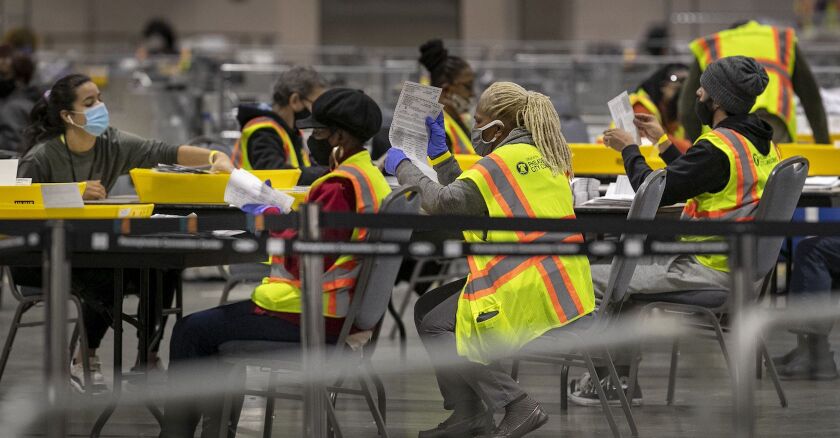In Brief:
As this year’s general election nears, one of the biggest challenges for election officials is filling gaps in the public's awareness of the technical rigor of the work they do and the ethical standards that safeguard it. The most egregious lie is that there are cracks in finely tuned election systems — and problems with the integrity of election officials — that are big enough for a false result to be possible.
After years of collaboration and discussion, a bipartisan group of current election officials has refreshed a code of ethics that has governed their profession for decades, to bring them into sharp focus during a challenging election season. The updated Standards of Conduct were published by the nonprofit Election Center (also known as the National Association of Election Officials) in partnership with the Institute for Election Administration Research and Practice at Auburn University.
Members of the working group that updated the standards were drawn from both parties. “At some point, someone asked who on the committee was Democratic and who was Republican,” says Hilary Rudy, deputy director for elections for the Colorado Department of State, who led the effort. “I honestly didn’t know because that’s not part of our conversation.”
Overall, most Americans do trust that elections are administered fairly, although Republican voters are less convinced. But the less voters know about the details of running elections and the ethical standards that govern this work, the more susceptible they are to false claims. “Our research shows that most Americans don’t know their election officials or understand what they do,” says Mitchell Brown, an Auburn University political scientist.
Bringing the public into processing centers and showing them the strict procedures that are in place to secure ballots and count them accurately is a well-established best practice for addressing election skepticism. The standards may serve a similar purpose, inviting the public into a culture that takes its mission seriously.
Common Language for Diverse Practice
In the U.S., each state conducts elections, including federal elections, according to its own rules. One of the goals for the refreshed code was to provide common language to describe elements of election administration that are consistent across jurisdictions. “It isn’t that you’re going to be doing things differently, as much as you have a way of explaining what you do that is consistent,” says Ricky Hatch, clerk/auditor for Weber County, Utah.
The changes in the standards themselves are subtle, but each is now accompanied by a list of steps necessary to fully apply it. These include an obligation to stay current on changes, seek legal counsel when needed and provide nonpartisan feedback to lawmakers when new laws are being put forward. Application of the responsibility for "fair and equitable treatment" of election stakeholders includes modeling the "professional and respectful behavior" election officials would hope to see from others.
The working group was careful not to create standards that could set the stage for violating local statutes, Hatch says. The idea was to codify concepts that could be widely embraced and build solidarity. Hatch would like to see state associations of election officials formally adopt the principles, modifying them if needed.
Hatch, a Republican, was also a member of a bipartisan group of advisers who drafted a white paper on ethical standards for election administration for the American Law Group. He sees this work, which includes a review of the history of ethics laws and principles for the field, as complementary to the Election Center standards and their focus on implementation.
It's important for democracy that everyone understands the rules that election officials play by, says Rudy, and the set of ethical principles that they share. The code can be a touch point for conversations with voters, shared on websites or posted in election offices. The Election Center is hoping to develop additional training resources around the topics in the standards, including resources that are available to the public, to keep the conversation around election integrity going.
Telling Their Story Better
The updated standards aren’t met to signal that high expectations are new to the world of elections. Tammy Patrick, CEO of programs for the Election Center, began her work in elections two decades ago in Maricopa County, Ariz. She came home from one of her first meetings with a 6-by-9 card from the Election Center that laid out standards of conduct and principles of ethics for an election official. When things were challenging, she would look to the card. “It hung on my wall for more than a decade,” Patrick says.
In recent years, misinformation casting doubt on the integrity of election workers has been amplified by major media outlets, social media platforms and even from pulpits. Almost 90 percent of election offices in the U.S. have five or fewer staff. A third have no full-time workers. It’s challenging for them to simply find the time to respond to false claims or design and execute campaigns to outcreate them.
Whatever the obstacles may be, it’s vital that election officials do a better job of telling their story. The standards of conduct come with a toolkit showing how they can be used as the foundation for communications. It includes advice regarding media strategies, messaging and social media (including graphics for use in social media campaigns).
The standards are just now being disseminated, although most election officials have their hands full with primary elections now. Wesley Wilcox, supervisor of elections in Marion County, Fla., was part of the working group for the new standards. He’s planning to work them into the materials he sends to voters in the months before the general election, and in his presentations to civic groups.
Wilcox hopes the public will come to realize that election officials work hard and that their efforts are informed by due diligence and respect for the law. “We’re not just throwing this thing together with duct tape and baling wire,” he says.
Related Articles













